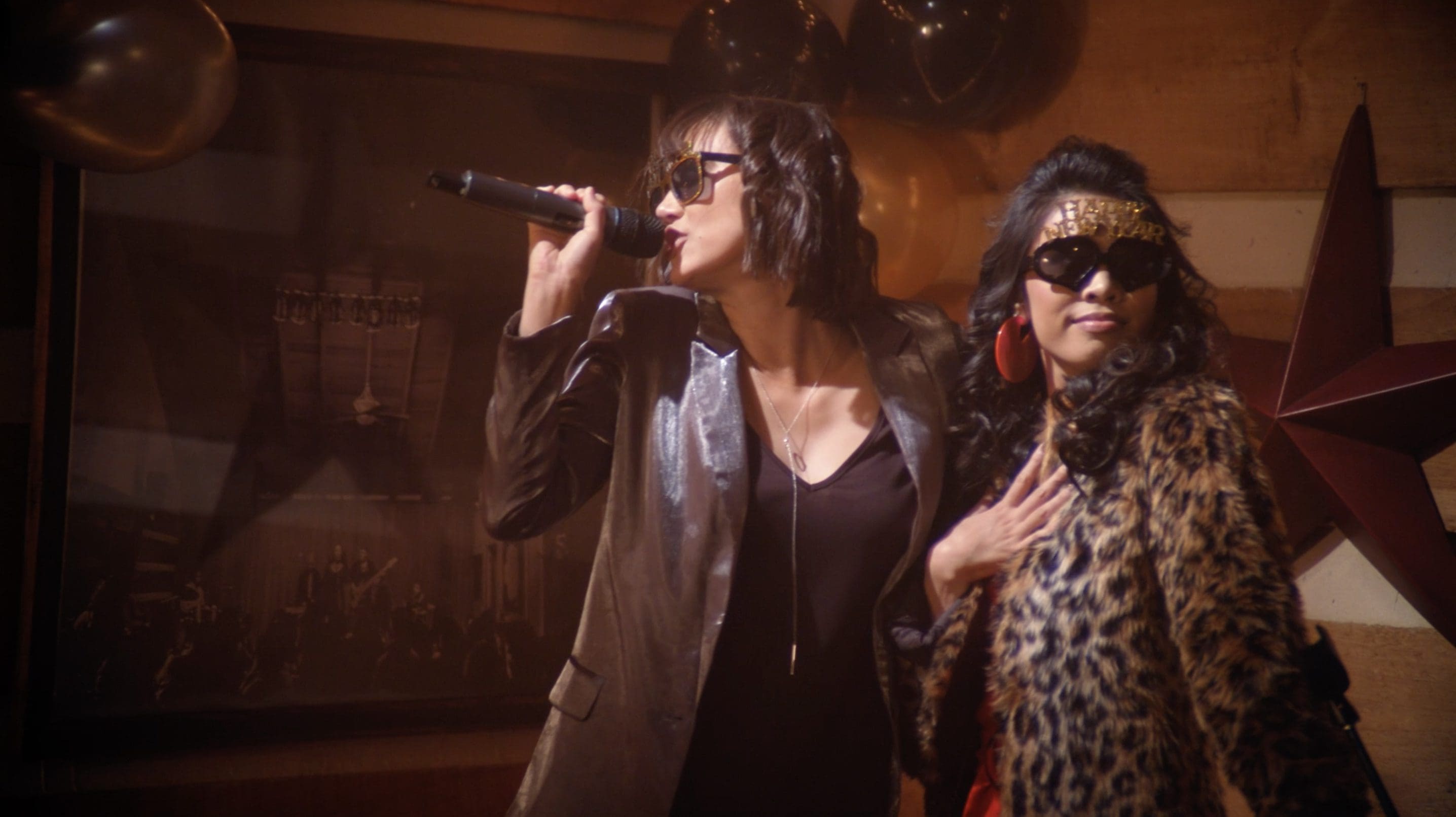
Holiday romances have been exclusively, oppressively heterosexual for so long that 2020 feels like a watershed year for queer entries in the genre. There’s Hulu’s Happiest Season, which has allowed Kristen Stewart to evolve from Team Edward vs Team Jacob to Team Harper vs Team Riley. There’s Netflix’s A New York Christmas Wedding, a perhaps unnecessarily dark, but emotionally complex romantic drama. Even Lifetime and Hallmark are finally jumping on the representation train. Now, there’s I Hate New Year’s from Tello, a network devoted to telling stories about queer women, and it may be the best of all.
The film stars former The Voice contestant Dia Frampton as Layne Price, a newly-minted pop star struggling to write a follow-up to her successful debut album. Convinced by her publicist’s psychic, Zelena (Candis Cayne, in the first of her dual roles) to return to her hometown of Nashville for New Year’s Eve, she spends the night working through past mistakes and trying to find her ex, Caroline (Kelly Lynn Reiter). Along for the journey are driver Marley (Cayne) and Layne’s best friend and fellow musician Cassie (Ashley Argota), who harbors a secret crush on Layne and may just hold the key to helping her move forward.
Unlike the average holiday romance, Layne and her friends aren’t musicians in a throw-away character trait sense. Rather, the film’s original music is integral to its success. The first thing director Christin Baker (also Tello’s CEO and founder) is Layne singing her breakout single “Flatline,” which is not only good, but a genuine bop. As written by Billy Steinberg and Josh Alexander (who also penned recent hits like Demi Lavato’s “Give Your Heart a Break”), it’s angry and a little bit bitter and it tells us right off the bat that Layne is a victim of love gone wrong.
Lyrically, every song in I Hate New Year’s either tells us something about the characters who sing them or pushes the plot forward in some way. We can guess that Cassie is secretly in love with Layne from how excited their mutual friend Freddie (Andrew Brennan) gets when she says she’s going to tell Layne something during this trip, but we don’t know how badly she’s yearning until she sings the mournful “Hours of the Night” alone at a piano. Frankly, the music is so strong that the film over-relies on it to do work the script should. Though “Flatline” hints at the traumas that Layne’s departure from Nashville inflicted, screenwriter Kathryn Trammell (who developed the original story with Baker, Ashley Arnold and Danielle Jablonski) forces the audience to piece together Layne’s full backstory throughout the movie and it’s a struggle to understand all the dynamics at work in the moment.
That said, even if the film had established the stakes from the beginning, they still might not be any easier to believe. We eventually learn that only a year has passed since Layne left her former band and girlfriend in the lurch to become a star and everyone feels too forgiving of the betrayals that have, by contrast, left her creatively inert. When Layne surprises her former bandmates at their New Year’s Eve gig, the women are not only happy to see her, but explain that they’re happy she abandoned them to take a chance on her career. While it’s sort of nice to see people acting like well-adjusted, big-hearted adults, not allowing Layne to experience consequences for her actions keeps her from growing and makes her path to recovery a little too easy.
Though those easy resolutions fit with the loose, fun tone–this is a world where Candis Cayne essentially plays a magical fairy godmother, after all–Baker is going for, the film’s magical realism and self-aware winks to the audience can undercut the emotional power of the character work. Worse, parts of the actual filmmaking can be distancing. Director of photography Micah Ellars’s camera placement can be stilted and worse, the frame often shudders or readjusts in a noticeable way during static dialogue scenes. Those brief but jarring flaws remind us we’re watching a movie and they can make it difficult to invest in the overall story.
Still, despite some really rough moments in the filmmaking, what allows I Hate New Year’s to succeed is the romance. Frampton has been a compelling screen presence since her The Voice days (albeit in a quiet, somewhat shy way) and that aloofness translates well to Layne’s wounded standoffishness here. Argota, by contrast, is vibrant and emotionally open as Cassie, desperate to make Layne happy while struggling to hide her massive crush. And though Layne is technically our protagonist, it’s Cassie with whom we empathize. Argota makes Cassie’s yearning painfully real every time she gazes at Layne or struggles to hide her hurt every time Layne mentions Caroline. We’d root for the couple just to see Cassie happy, but Argota and Frampton also have really good chemistry—something even the best Hallmark and Lifetime holiday romances often fail to deliver.
Indeed, what allows I Hate New Year’s to rise above some of the other queer holiday romances this year is that it actually gives the viewer a romance worth rooting for. Not even Happiest Season, with all its polish and pedigree could quite deliver that. Layne and Cassie are cute and fun and even genuinely likable and talented. That should be the bare minimum for a romance film, but while so many in the genre can’t clear that bar, I Hate New Year’s makes it look easy.


Comments are closed.